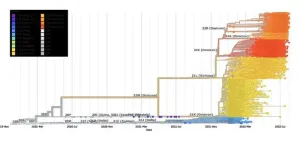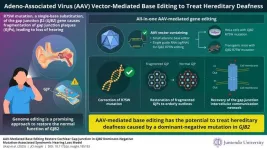(Press-News.org) Artificial intelligence (AI) could help sonographers identify any abnormalities at the 20-week pregnancy screening scan almost twice as quickly, without reducing the accuracy or reliability of diagnoses, a new study has shown.
This will help improve patient care by allowing sonographers to focus on other aspects of the scan, such as communicating with parents or spending more time looking at any areas of concern.
The trial is the first of its kind to use AI for the 20-week pregnancy scan on real patients, and is led by King’s College London and Guy’s and St Thomas’ NHS Foundation Trust and funded by the National Institute for Health and Care Research (NIHR).
Results from the trial, published today in NEJM AI, found that AI-assisted 20-week scans were significantly shorter than standard scans, reducing the scan length by over 40%.
For many expectant parents, the 20-week pregnancy screening can be a worrying experience as sonographers are looking for signs of 11 different conditions in a baby, such as heart defects or spina bifida. However, the extra time freed up by using the AI tool allows the sonographer more time to focus on the parents, which may help to ease anxieties.
Dr Thomas Day, lead author of the study, who is a Clinical Research Fellow at King’s College London and a Consultant Paediatric and Foetal Cardiologist at Evelina London Children's Hospital, part of Guy’s and St Thomas’, said: “Understandably this 20-week scan can be a nerve-wracking time for parents, as they’re finding out the health of their unborn child. Our research has shown that AI-assisted scans are accurate, reliable and more efficient. We hope that using AI in these scans will free up precious time for sonographers to focus on patient care, making the experience more comfortable and reassuring for parents.”
The trial featured 78 pregnant participants and 58 sonographers. Each pregnant participant was scanned twice, once using the AI-assisted scanner and once without the use of AI.
The study showed that the AI-assisted scans – which automatically took several thousand snapshots of each foetal measurement compared to three taken by a human sonographer – were more reliable compared to manual measurements. This may improve the accuracy of assessing foetal growth and health, helping medical professionals make decisions earlier that could improve health outcomes for the baby.
The AI-tool alters the way in which the scan is performed, as sonographers no longer need to pause, save images, or measure during the scan, resulting in fewer interruptions and making the process smoother.
Ashleigh Louison, a 36-year-old senior operations manager from north-west London, was one of the participants in the trial at St Thomas’ Hospital. During her pregnancy, her son Lennox was diagnosed with heart disease. This early diagnosis allowed doctors at St Thomas’ and Evelina London Children’s Hospital to plan immediate medical care for Lennox when he was born, including lifesaving surgery within two weeks of his birth.
She said: “Receiving an early diagnosis for Lennox was really important, as it meant we could properly plan the road ahead. We immediately knew that he would likely need open heart surgery and that we would be staying in hospital for a few weeks after his birth. This gave us the chance to physically and mentally prepare for what was coming.
“I am so glad to have participated in this trial as I want to support anything that can help save children’s lives through faster and earlier diagnoses of conditions. I know that some conditions can be hard to spot, and so I’m excited at the prospect of using new technology that can help address this. If my participation in this trial ends up helping even just one family, then I’m all for it.”
The AI tool is now being rolled out more widely through a company called Fraiya, which is a University-NHS spinout company from King's College London, Guy's and St Thomas' and King’s College Hospital. The company’s goal is to create AI-powered tools for pregnancy ultrasound that improve medical diagnoses, help healthcare professionals, and enhance care for patients.
Fraiya has been developed as part of the MedTech Venture Builder programme at The London Institute for Healthcare Engineering (LIHE).
Professor Reza Razavi, senior author of the study and Professor of Paediatric Cardiovascular Science at King’s College London and a Paediatric Cardiologist at Guy's and St Thomas', said: “It is vital that congenital problems in unborn babies are picked up in pregnancy to help give them the best possible outcomes after birth. Our study shows that combining cutting-edge AI with human expertise could make these scans much quicker and easier to do, whilst maintaining the accuracy and reliability of the scans. This is a great way of improving staff experience whilst also improving the care of mothers and babies. AI can support the scanning clinicians to work at the top of their game so every hospital across the country can really deliver great care.”
Professor Mike Lewis, NIHR Scientific Director, said: "Anything that improves the experience of expectant mothers, gives them reassurance and tailors the care they are offered by healthcare professionals can only be a good thing.
"The use of AI in healthcare has huge potential to impact patient care while saving time and money. This research is another great example of how NIHR works for the health and wealth of the nation.”
END
AI could help sonographers identify abnormalities in unborn babies more quickly
2025-03-27
ELSE PRESS RELEASES FROM THIS DATE:
First clinical trial of an AI therapy chatbot yields significant mental health benefits
2025-03-27
Dartmouth researchers conducted the first clinical trial of a therapy chatbot powered by generative AI and found that the software resulted in significant improvements in participants' symptoms, according to results published March 27 in the New England Journal of Medicine AI.
People in the study also reported they could trust and communicate with the system, known as Therabot, to a degree that is comparable to working with a mental-health professional.
The trial consisted of 106 people from across the United States diagnosed with major depressive disorder, generalized anxiety disorder, or an eating disorder. ...
AI learns to ‘speak’ genetic ‘dialect’ for future SARS-CoV-2 mutation prediction
2025-03-27
It’s been five years since COVID-19 was declared a global pandemic. As SARS-CoV-2 shifts to endemic status, questions about its future evolution remain. New variants of the virus will likely emerge, driven by positive selection for traits such as increased transmissibility, longer infection duration and the ability to evade immune defenses. These changes could allow the virus to spread among previously immunized populations, potentially triggering new waves of infection.
Predicting new mutations in viruses is crucial for advancing life science research, particularly when trying to understand how viruses evolve, ...
$50 million gift from the Weill Family Foundation establishes the Weill Cancer Hub East
2025-03-27
New York, N.Y., and Princeton, N.J. (March 27, 2025)—With a mission to understand how nutrition and metabolism impact the body’s ability to control cancer, four leading research institutions have united under the Weill Cancer Hub East, an innovative, collaborative partnership that aims to transform cancer treatment. The initiative connects world-class experts from Princeton University, The Rockefeller University, Weill Cornell Medicine and the Ludwig Institute for Cancer Research to enhance a ...
Physics meets art: a new twist on interference patterns
2025-03-27
Tokyo, Japan – One of the simplest and most beautiful naturally occurring patterns can be observed when light is shined through a pair of slightly misaligned periodic structures. This phenomenon, known as the moiré effect, is not only pretty to look at, but also has important consequences for the properties of materials.
In an article published in ACS Nano, a team led by researchers from the Institute of Industrial Science, The University of Tokyo, announced the discovery of a previously unseen moiré pattern: a series of periodic one-dimensional bands in tungsten ditelluride bilayers.
In nanomaterials, moiré patterns ...
Elevating global heart failure care with new certification
2025-03-27
DALLAS, March 27, 2025 — More than 56 million people globally live with heart failure (HF), which prevents the body from getting enough of the oxygen-rich blood it needs to work properly.[1]
While there is no cure for HF, many people with this condition can live full, enjoyable lives and disease progression can be slowed with the right treatment. Research shows that outcomes for patients with HF improve when health care professionals and hospitals provide guideline-directed medical therapies.
A new Heart Failure Center ...
The MIT Press releases 2025 Direct to Open (D2O) Impact Report
2025-03-27
The MIT Press is proud to release our 2025 Impact Report for Direct to Open (D2O), our sustainable framework for open access monographs that shifts publishing from a solely market-based purchase model where individuals and libraries buy single eBooks, to a collaborative, library-supported open access model.
The continued growth in the reach of open access publishing couldn’t be more timely. In 2025, access to truth and facts are under attack, and democratizing access to trustworthy, peer-reviewed information has never been more important. In the face of so many forces working against the spread of knowledge, Direct to Open continues to be a critical tool.
To date, ...
New study reveals the curative potential of genome editing approach for genetic deafness
2025-03-27
Congenital hearing loss refers to impaired auditory function that occurs due to genetic causes. GJB2 is the gene responsible for approximately half of all cases of hereditary hearing loss. Connexin 26 (CX26), which is encoded by GJB2, helps in the formation of intercellular gap junctions—channels that allow for the movement of ions and chemical messenger molecules between adjacent cells, where it regulates auditory function.
GJB2 mutations often lead to fragmentation of gap junctions and gap junction plaques (GJPs) which are composed ...
AAAS elects Keck School of Medicine of USC molecular biologist Yali Dou as 2025 fellow
2025-03-27
Molecular biologist Yali Dou, PhD, holder of the Marion and Harry Keiper Chair in Cancer Research and professor of medicine and cancer biology at the Keck School of Medicine of USC, has been elected a fellow of the American Association for the Advancement of Science (AAAS). She is one of seven USC faculty members in the 2025 cohort of new fellows.
The AAAS is the world’s oldest and largest general science organization and the publisher of Science, a top peer-reviewed academic journal. Election as a fellow is a lifetime honor — one of the AAAS’s ...
Damaging cluster of UK winter storms driven by swirling polar vortex miles above Earth
2025-03-27
University of Leeds news
Embargoed until 10:00 GMT, 27 March
Damaging cluster of UK winter storms driven by swirling polar vortex miles above Earth
Powerful winter storms which led to deaths and power outages in the UK and Ireland were made more likely by an intense swirling vortex of winds miles above the Arctic, say scientists.
A team of researchers led by the University of Leeds has pinpointed a new reason for winter storm clusters such as the trio named Dudley, Eunice and Franklin, which hit the nation within the space of a week in February 2022.
The findings which are published today in the journal ...
Losing forest carbon stocks could put climate goals out of reach
2025-03-27
In the past, intact forests absorbed 7.8 billion tonnes of CO₂ annually – about a fifth of all human emissions – but their carbon storage is increasingly at risk from climate change and human activities such as deforestation. A new study from the Potsdam Institute for Climate Impact Research (PIK) shows that failing to account for the potentially decreasing ability of forests to absorb CO₂ could make reaching the Paris agreement targets significantly harder, if not impossible, and much more costly.
“Delaying action leads to disproportionately higher costs,” explains Michael Windisch, ...





